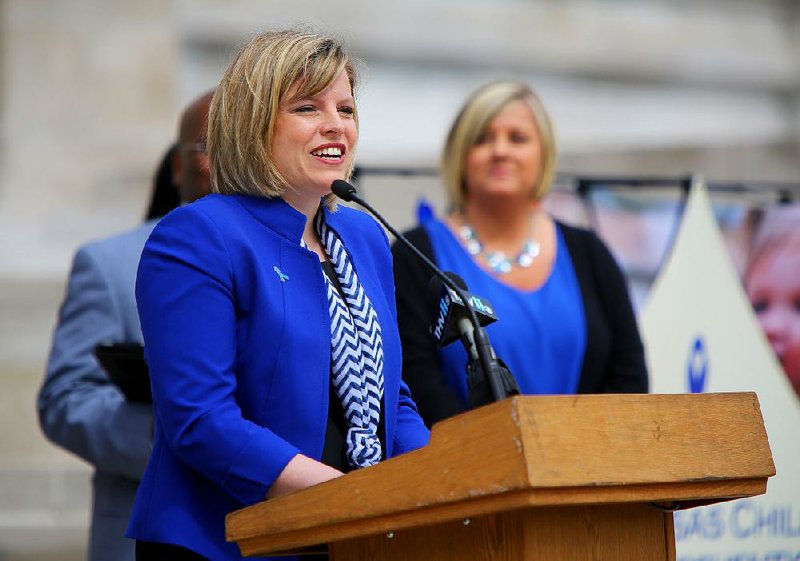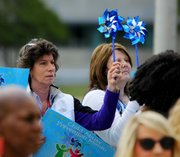Building partnerships with nonprofits, the judiciary and other child advocates is a key goal for Mischa Martin, interim director of the Division of Children and Family Services.
The division, part of the state Department of Human Services, oversees child abuse and neglect cases, provides foster homes for children who need them and offers adoption programs.
During a rally against child abuse on the front steps of the Capitol on Thursday, Martin told the crowd of more than 100 that building relationships with stakeholders is her mission.
"Partnerships are the backbone of nearly every successful prevention campaign," she said. "Partnerships produce results that one member alone can't produce. It takes all of us in the community -- and we have many stakeholders who help us."
She thanked nonprofits -- including The Call, Project Zero and Child Advocacy Centers and others -- as well those in the court system.
The division and judiciary have gone back and forth during legislative Joint Performance Review Committee meetings.
Cecile Blucker, the previous division director, repeatedly told lawmakers that some judges stand in the way of placing abused children with willing relatives. During her last appearance before the panel, she said Pulaski County Circuit Judge Patricia James does not allow children to be placed with relatives.
In response, James said she does not and will not place abused children with relatives who have not been properly vetted by the Department of Human Services.
Martin -- who became interim director April 1 -- struck a different tone in an interview Thursday. She said there are great judges who decide child welfare cases.
"We need to convince our judges that we're making good decisions," she said.
Thursday's rally highlighted April as Child Abuse Prevention Month.
Tiffany Wright, a caseworker, told the crowd that the day she became a caseworker, Nov. 9, 2009, changed her life.
She said she thought she could change the world.
"On Day 1, I remember finding myself with a co-worker at a home removing a small child who had been neglected due to parental drug use," she said.
And over the past six years, she has visited roach-infested homes, conducted drug screenings, filed court reports and was awakened by emergency calls in the middle of the night.
"Family service workers work hard to fill the void of not having that support that every child wants," Wright said. "I have one 11-year-old boy that weighs heavily on my heart. I'm his only support and every phone call with him concludes with an 'I love you.' There's nothing more heart-wrenching than his need for someone to love him back -- just as he loves everyone else."
She holds out hope. In Searcy, there's a mother she reunited with her child.
"Every now and then she'll send me updates about the family," Wright said. "She is always excited to share her progress with me."
Cindy Gillespie, director of the Department of Human Services, told the crowd the division is full of people like Wright.
"Once I came into DHS, I found that everyone I met with said the same thing as they would talk about their jobs and talk about what was going on," she said.
Caseworkers, Gillespie said, refer to children in the state's care as "our children" or "my children."
"I realized I have 7,500 people who think about the children and know they're our children," she said. "That matters -- they're our children."
And first lady Susan Hutchinson asked the crowd to pray for everyone dealing with the state's children.
"People make a difference," she said. "And we rely on the people in DHS and throughout to make great decisions and have great wisdom."
Her husband, Gov. Asa Hutchinson, has proposed increasing the division's budget from $71.1 million to $91.5 million next year.
"Here's the bottom line. Right now, this fiscal year -- so fiscal year 2016 -- we have more kids than we anticipated and our costs are almost $20 million more than we thought they were going to be," said Amy Webb, a spokesman for the department.
"We don't think we're going to have less kids come July 1st so we've got to have that in our base budget to not do anything new -- just care for the kids we've got."
Martin said the division is trying to figure out the reasons behind the increase. Currently, there are 4,858 children in foster care.
"We have a real placement crisis," she said in an interview. "We don't have enough foster homes to serve all of our foster children and we need our children while they're in an interim position to be in a family-like setting."
Blucker frequently said the division needs more caseworkers and more foster families to do its job effectively.
The division's staff members juggle twice the casework load of their out-of-state peers and transport children across the state when foster homes aren't available.
Metro on 04/15/2016

